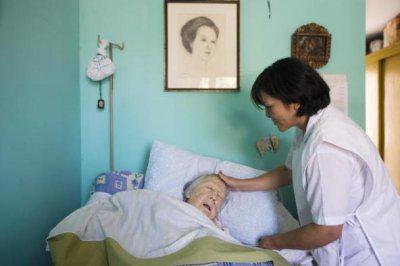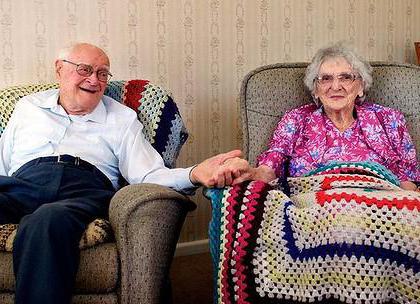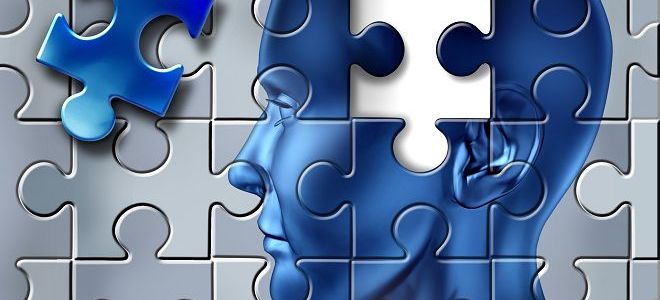Diagnosis of senile dementia. Types of dementia and causes. Dementia syndrome in old age.
Memory, intelligence and speech, provoked by changes in molecular exchange between cells in the cerebral cortex caused by for various reasons. And the more pronounced these changes are, the more severe senile dementia, called dementia in medicine, occurs. Old man At the same time, he loses not only his existing knowledge, experience, and ability to learn, but also his own personality.
Is Alzheimer's disease infectious in humans?
Still no scientific proof that Alzheimer's disease is contagious in humans. Therefore, no special protection is required during daily handling or treatment of patients. However, the question of possible infectiousness in basic research is not ignored. Experiments with genetically modified mice suggest Alzheimer's disease may be transmitted to laboratory conditions. Laureate's research results Nobel Prize Stanley Prusiner also raises the question of whether Alzheimer's disease may be triggered by synthetic beta-amyloid.
About what causes dementia, how many years people live with this diagnosis, and what they look like different types we will discuss this pathology later in the article.
Classification of dementia
Having noticed that the habits, character and communication abilities of an elderly person living nearby are changing, relatives begin to worry, fearing the worst option development of events - total dementia, which, as a rule, turns out to be a harbinger of imminent death loved one. Is it so? How quickly does the brain age?
What types of dementia are there?
However, these results do not apply to humans. Alzheimer's disease is the most common form of dementia, accounting for about two-thirds of all cases. On the other hand, neurological research and science has over 50 different forms of dementia, which often also appear as mixed forms.
About 15% of all dementias are vascular dementia caused by a disorder of the blood supply to the brain. The reason is either torn blood vessel, or a blood clot. In both cases, brain tissue is destroyed. Abnormal brain cell densities also lead to dementia. This form is known by the English term "Dementia with Lewy bodies." Their symptoms are similar to those of Parkinson's disease and Alzheimer's disease. The cause of this type of dementia is not yet known. Estimates of how many people suffer from dementia with Lewy bodies vary widely.
To understand this, you need to determine what type of dementia you have encountered. In medicine, there are different classifications of this pathology. And since she is not independent disease, then, depending on the main problem that caused it, the following types of dementia are divided:
- An atrophic type of disease (provoked by Alzheimer's or Pick's disease), which occurs against the background of initial degenerative reactions occurring in the cells of the central nervous system.
- Vascular, caused by atherosclerosis and hypertension. It occurs due to impaired blood circulation in the brain.
- Mixed type - the development of this pathology has mechanisms similar to atrophic appearance, and on the vascular.
Causes of dementia
The described problems can begin their destructive effect as a result of natural process aging of the body, and due to diseases of internal organs, thyroid gland diseases, neurological and vascular pathologies(such as ischemia, arterial hypertension, atherosclerosis, etc.).
This is probably the third most common form. Frontotemporal dementia is somewhat less common than dementia with Lewy bodies. In the brain, among other things, forehead and/or symptoms and associated symptoms. Anticipation and anxiety, compulsive impulsive behavior, impulsiveness, decreased grooming, slow loss speech.
Are memory problems a symptom of Alzheimer's disease?
As people age, they are more likely to complain about memory problems. However, slight forgetfulness and “slow” memory are normal process aging. Older people simply need more time to learn new things or remember old ones. Everyone forgets to forget where he put his car keys. However, people with Alzheimer's disease can no longer remember what a key is. Therefore, Forgetfulness means that a person does not remember a specific detail of an event, whereas in the case of dementia, the entire event has disappeared from memory.
Alcohol intoxication or narcotic substances can also push the body to pathological changes. Destructive action renders and chronic poisoning poisonous chemical compounds in production.
Strokes, tumors and head injuries can also sever neural connections which will ultimately lead to dementia.
Memory problems may be a sign of Alzheimer's disease, but it doesn't have to be. Therefore, it is generally important to be able to have this examined by a doctor. Only he can determine what is causing the forgetfulness. There are other conditions that can contribute to the development of memory problems and dementia, such as infections, drug abuse, metabolic and eating disorders, brain tumors, depression or other progressive diseases such as Parkinson's disease.
What is the cause of death in Alzheimer's disease?
On last stage Alzheimer's patients require care around the clock.
Can Alzheimer's disease cause violence and aggression?
Aggression and violence can lead to dementia. They arise for many reasons. The disease places extreme demands on the patient. While physical violence is relatively rare, verbal aggression or arguments tend to occur more often. People with dementia are temporarily depressed, frustrated, or unable to recognize their deficits as clearly as a nurse.True, cases have been recorded when the causes of dementia lie not in the process of natural aging or the listed diseases, but in taking medicines. In such cases, the process is reversible if the amount of such drugs is limited or discontinued. 
Dementia due to Alzheimer's disease
Most often the reasons are causing development hidden in organic damage to those areas of the brain that are responsible for human thinking and memory. And the most common among them is Alzheimer's dementia, that is, dementia resulting from degenerative processes in neurons and destruction of synaptic connections.
In addition, dementia is also caused long period mourning, which can also cause anger. Pharmacotherapy is primarily aimed at relieving symptoms of Alzheimer's disease and treating possible comorbidities. Mental behavior patients should be improved and their daily treatment should be facilitated and possible behavioral problems or depression should be mitigated. What is the effect of the drugs? Because as a patient's needs change over the course of the disease, drug compatibility may change.
During this disease, amyloid (protein) plaques, as well as neurofibrillary tangles, form on the nerve cells of the patient’s brain, which ultimately causes the death of these cells. Pathological areas atrophy as a result of these processes, and damage over time affects the entire brain, and this process, alas, is irreversible.
What medications are not available?
Non-drug therapies can help keep patients engaged in activities for as long as possible. public life and also have a positive impact on the patient’s condition. Treatment is used by trained therapists depending on the symptoms and extent of the disease. First contact person in case of memory problems is family doctor, who can then refer the patient to a neurologist, psychiatrist, or memorandum. Memory rooms, also known as memory clinics, are departments associated with hospitals that specialize in brain disorders.
How does Alzheimer's dementia develop?
All stages of dementia in Alzheimer's disease are characterized primarily by an increase in short-term memory impairment, and as it progresses, a narrowing of the range of interests, insufficient resourcefulness, inattention, passivity, slowness of thinking and motor reactions, and irritability. 
How do Alzheimer's patients experience nutrition and sexuality, and what changes?
The desire for intimacy and tenderness also persists into old age. However, the topic of “sex in old age” is still considered a taboo in society. Another component of the table is added when one partner suffers from Alzheimer's disease. IN many respects healthy partner must say goodbye to famous person through progressive changes caused by Alzheimer's disease. It also changes the overall intimacy.
There is no guidance on how sexual behavior develops in patients with Alzheimer's disease over time. It may happen that pleasure subsides completely, reawakens, or sexual de-inhibition occurs. Ideas, inclinations and desires that were repressed before the illness may come to the surface and then perhaps survive. Changes may result in a change in the rolling ratio of the pair. This may occur, for example, when patients in a nursing home exchange affection with supposed strangers.
Later, patients discover a lack of understanding of the events taking place around them; they can repeat what was said for a long time, treat others inadequately, and uncritically treat themselves. And over time, they may develop paranoid ideas and hallucinations.
Total dementia in this case is accompanied muscle rigidity and loss of urinary and bowel control. Epileptic seizures may occur.
How is sexuality treated in a treatment facility?
A diagnosis of Alzheimer's disease can also lead to a cut in the affected person's sexuality. Because Alzheimer's patients experience pleasure and, in some cases, sexual de-inhibition, sexuality does not stop at feeding either.
Complete social degradation
This represents serious problem for nursing facilities, which will currently cost differently. In many homes, sexuality remains a taboo issue. There is no clear and comprehensive guidance yet. In general, when an Alzheimer's patient receives a sexual history, it can make care easier because doctors and nurses can better adapt to the patient. However, this requires the necessary structures - first of all, trained personnel.
How long people live with this type of dementia depends on many reasons, and on average it is about 6 years, but the process can last as long as 20. K fatal outcome, as a rule, result from intercurrent (random) diseases that arose against the background of dementia.
Alzheimer's disease, according to statistics, is the cause of dementia in 70% of recorded cases. But, unfortunately, not only this pathology can push to the onset of the development of dementia.
A husband describes his wife, who has Alzheimer's disease, as counting and rhyming. It's much clearer than usual. Her laugh shows that she enjoys it. However, he is worried about his wife. Since people with Alzheimer's disease have short-term memory and memory for the more recent past, this woman likely refers to long-established, learned words and rhymes.
Many people with Alzheimer's disease always ask the same question: to identify or express a certain concern. Sentences, phrases, and even poems are often repeated. Sometimes the patient also tends to perform the same activity over and over again, like vacuuming shelves or cleaning shoes. This is usually not a cause for concern, but rather a sign that the patient has found a job that he likes or is doing well.
Vascular dementia: causes and symptoms
Against the backdrop of violations cerebral circulation vascular dementia develops. In older people, as already mentioned, it can be triggered by atherosclerosis, hypertension, cerebral vascular ischemia, arrhythmia, heart defects, pathologies of the heart valves or increased content in blood lipids. By the way, among the male population, the predisposition to the vascular form of dementia is one and a half times higher than among women.
Bring it all medical records to see your doctor, as well as a list of medications you are currently taking. If you do not know the names of your medications, take your medication with you. A drug or even a combination of certain drugs can sometimes cause similar symptoms, such as Alzheimer's disease. Since time to see a doctor is often limited, you should also make a list of symptoms and complaints. Therefore, do not forget anything that you want to contact your doctor.
What is the cost of long-term care insurance?
The nursing insurance continued to have five nursing classes. The goal is to better accommodate the different needs of people requiring care. The concept of long-term care has been expanded. Since the need for medical care, people with physical limitations, but also mentally or mentally retarded patients are no longer considered to be in need of care. People with Alzheimer's disease or other dementias benefit more from long-term care insurance. The need for help is no longer measured in the same way over the time required for help.
At the initial stage of the disease, symptoms are expressed by irritability, increased fatigue, sleep disturbances, lethargy and headaches. At the same time, absent-mindedness and depressive experiences become systematic.
Subsequently, the patient's memory is noticeably impaired. This is expressed in disorientation, as well as in forgetting names, dates, etc.
The last stage of dementia development
The decisive factor is how independent a person is. For classification, the degree of self-employment is decisive in six areas. Spiritual and communication skills: For example, local and time orientation, needs shape behavior and psychological problems: For example, night disturbances, aggression, lack of drive. Self-sufficiency: Personal care, disease management and therapy: Medication administration, visiting independent doctors. Design Everyday life and social contacts: daily organization, social contacts. Stairs, sitting down and standing up, moving in the house. . Anyone who wishes to receive benefits from long-term care insurance must submit an application.
By the way, how dementia develops and how many years patients with this diagnosis live directly depends on whether they have had a stroke in their history. In this case, life expectancy is greatly reduced. The neurological symptoms of this pathology are: hemiparesis, rigidity, disturbances in speech, swallowing, walking and urination.
Even with a diagnosis of Alzheimer's disease, there is no automatic maintenance benefit. The application is submitted to the competent nursing fund, which is linked to the health insurance funds. During a home visit, the assessor assesses how independent the applicant can be in everyday life. As preparation, it is advisable to keep a nurse's book that identifies situations in which assistance is needed. Doctor's reports and other important documents, such as those from supervisory authorities, must be made available.
It is also recommended that a person be present during the assessment who supports the person in need of care, such as a carer or carer. The decision on classification into a nursing degree is made by the nursing foundation based on expert opinion. This decision may be opposed. If a nursing degree is granted, the nursing fund pays retroactively to the date of the original application. You can choose between cash payment and in-kind contribution.

Is it possible to avoid missing the onset of dementia? Signs of the disease
Unfortunately, initial stages It is almost impossible to detect the onset of dementia, since it is a long and slow process that can last for 10-15 years. A person’s memory for what happened recently gradually deteriorates, but memories of events that happened long ago are retained.
Dementia in older people mainly involves loss of learning and intelligence. It is increasingly difficult for patients to navigate in space and time. And soon it turns out that it is already quite difficult for them to select the right words, and their speech is noticeably impoverished. By the way, no less problems arise in the process of operating with numbers.
It's interesting that some people for a long time are able to hide signs of dementia by avoiding complex activities (such as balancing a checkbook). And they are revealed by a noticeably reduced interest in reading and any type of activity. Those who cannot rebuild their lives find themselves in a difficult situation, since their ability to perform everyday duties is reduced - the person constantly forgets about important things or does them incorrectly.
How does dementia begin to develop?
Of course, the development of dementia and life expectancy with this disease depend on many reasons: health status, previous illnesses, personal characteristics, relationships of others and much more. But if we talk about the signs of the disease in general, we can highlight some common features changes occurring in a person:
- Most often, changes in the patient’s character become especially noticeable. His individual personality traits become aggravated, for example, frugality develops into stinginess, and perseverance into stubbornness.
- It is increasingly difficult, or rather impossible, for a person to change his established view of events. He develops conservatism.
- Thought processes deteriorate.
- Often the listed signs are followed by violations of moral standards of behavior (patients with dementia lose their sense of shame, the concept of duty, their spiritual values and life interests are leveled).
Over time, they begin noticeable changes in memory, and disturbances in temporal and spatial orientation. True, the characteristics of behavior, gestures and speech of a particular person remain unchanged for a long time.

The last stage of dementia development
As is known, the most rapid decline of the patient occurs in the last, severe stage of the disease. The development of dementia at this time is characterized by trembling of the fingers, impaired coordination and gait, and exhaustion. The patient's speech becomes choppy, and information about himself becomes fragmentary.
An elderly person in this state can no longer live without outside help take care of yourself, eat and follow basic rules hygiene. Most patients experience a disturbance in the process of urination. This can be either stagnant processes or uncontrolled urine output.
The disease shortens the lives of those who suffer from it, due to the fact that in the severe stage of dementia the patient is no longer able to report ailments to the doctor, and in addition, older people most often do not develop fever or leukocytosis as a response to infection. In this situation, the doctor has to rely only on his insight and experience, but, unfortunately, any associated infection can cause the death of such a patient. 
Features of the course of senile dementia
It is interesting that the so-called senile, or senile, dementia in older people sometimes demonstrates a clear dissociation between obvious dementia and forms of behavior that have remained unchanged. The patient's previous demeanor, gestures, correct speech, lively intonations. All this often misleads outsiders. He thinks he's talking to absolutely healthy person, and only by chance asked question discovers that the old man who speaks so interestingly, reporting a lot of examples from the past, is not able to say how old he is, whether he has a family, where he lives and who he is talking to now.
Senile dementia in older people in most cases is not accompanied by psychotic conditions that are inherent in the vascular form of this disease. This is, of course, in to a large extent makes life easier for both the patient and his loved ones, since such a patient does not cause serious trouble to those around him.
But often this category of patients also exhibits signs of psychosis, which are accompanied by insomnia or inversion (time shift) of sleep. These patients may experience hallucinations, increased suspicion, and mood swings from tenderness to aggression.
And to provoke all these severe symptoms may changes in blood sugar levels, pressure changes and other health problems. Therefore, it is very important to protect older people with dementia from all kinds of diseases, having both chronic and acute forms.
Why does senile dementia occur?
For what reason does senile dementia appear in the elderly, and why in these cases the human brain begins to age faster than normal, is not yet completely clear.
Some researchers believe that in old age Immune regulation disorders appear, which causes autoimmune processes. And the resulting autoantibodies damage brain cells. Cerebrospinal fluid, which normally contains immunocompetent cells that play protective role, in old age greatly changes their ratio and properties, which leads to pathological changes in the central nervous system.
Dementia in older people is caused by genetic factor. It was found that the risk of the disease increases 4.3 times in those families where there were already cases of this pathology. Somatic diseases can reveal symptoms that were previously mild senile dementia, change its picture and accelerate the rate of progression, while timely elimination of these ailments may, in some cases, lead to a slower development of dementia. 
Life expectancy of patients diagnosed with dementia, at what age to expect it
Researchers from the University of Cambridge identified patients with established diagnosis"senile dementia". How many years such patients live, according to scientists, largely depends on external factors, but on average it is 4.5-5 years.
By the way, statistical data confirm that dementia between the ages of 60 and 69 occurs in approximately 2% of cases, and after 80 years, up to 20% of older people are susceptible to it. By age 90, the risk of developing the disease increases to 45%.
Although it should be noted that the figures given are very approximate, since quite large percentage older people do not come under the supervision of psychiatrists because they do not have psychotic conditions, and it all comes down to problems with memory, intelligence and minor mood swings. Such patients are found in families, it is quite convenient to care for them, and they do not create big problems for their loved ones.
Speaking about how long people with dementia live, it should be emphasized once again that very few people die from this diagnosis. These include only those who died from accidents associated with the characteristics of this disease. Mostly, death occurs from a stroke or heart attack, most often accompanying the vascular form of the disease.
What is the prognosis for dementia
Being increasingly common in older people, the described pathology is mostly irreversible, and modern medicine, unfortunately, can only slow down the process or remove unpleasant symptoms arising from a diagnosis of dementia.
It is difficult to say exactly how many years people live with this disease, since, for example, with rapid progression vascular form possible in just a few months. The cause is most often concomitant diseases in the form of sepsis (in bedridden patients) or pneumonia.
Acquired dementia, which most often affects older people, is called dementia (from the Latin for “madness”). This pathology is not congenital, but acquired. Before the disease, a person is able to think logically and take care of himself, but partially loses these abilities.
Dementia - what is it?
It is important to understand when dementia sets in that it is a disease that is caused by damage to the brain. Dementia affects people of all ages, not just the elderly, and the number of people affected is steadily increasing. Unlike other disorders, for example, mental retardation, this syndrome acquired and does not indicate mental underdevelopment. Dementia is severe disorder nervous activity, as a result of which the patient loses acquired skills and knowledge and cannot acquire new ones. Decay is observed mental functions healthy person.
Dementia in psychology
Often the syndrome develops as a result of other diseases (Parkinson's, Pick's, Alzheimer's, etc.) or injuries. The disorder occurs in the cerebral cortex and may have various shapes by severity and course: mild, moderate and severe. If available concomitant disease and it progresses, dementia itself develops, the disease depersonalizes the patient. The patient loses most of his thinking, ceases to cognize the world, and interest in life fades away. The syndrome manifests itself in many ways: memory, speech, logic are impaired, and depressive states appear.
Dementia - causes
This syndrome occurs as a result organic damage brain after injury or some disease (sometimes several at once). More than 200 can provoke the disease pathological conditions. In specific forms of dementia, disturbances in the cerebral cortex are the leading mechanism of the disease. In other cases, damage to the central nervous system is a consequence of this syndrome.

The most common causes of dementia:
- Alzheimer's disease (up to 65% of all cases);
- vascular damage caused by atherosclerosis, arterial hypertension, impaired circulation and properties of blood;
- alcohol abuse and drug addiction;
- Parkinson's disease;
- Pick's disease;
- traumatic brain injuries;
- endocrine diseases(problems with thyroid gland, );
- autoimmune diseases (multiple sclerosis, lupus erythematosus);
- infections (AIDS, chronic meningitis, encephalitis, etc.);
- diabetes;
- serious illnesses internal organs;
- consequence of complications of hemodialysis ( blood purification),
- severe renal or liver failure.
Dementia - symptoms
There are three stages of the disease, so each of them has its own symptoms:
- Main symptom of this disease– progressive memory disorder. Obvious signs of dementia are sudden onset of irritability, cruelty, sloppiness, and regression in a person’s behavior.
- Secondary signs syndrome: amnestic memory disorders, when the patient ceases to recognize himself in the mirror, confuses the right and left hand and so on.
- At the last stage it begins to increase muscle tone, which can lead to a vegetative state and death.
Depending on the degree of the disease, its symptoms and the patient’s reaction are expressed differently:
- For dementia mild degree he is critical of his condition and is able to take care of himself.
- At moderate degree lesions, there is a decrease in intelligence and difficulties in everyday behavior.
- Severe dementia - what is it? The syndrome means a complete breakdown of personality, when an adult cannot even relieve himself or eat on his own.
How to avoid dementia?
Senile dementia is one of the leading causes of disability in older people. People don’t think about the development of the syndrome in their youth, but the first signs of degradation can appear as early as 55-60 years of age. When wondering how to prevent dementia long before its possible manifestation, you need to introduce several rules and useful habits into your life:
- giving up alcohol and smoking;
- proper nutrition (daily use required quantity vitamins, avoiding fast food and fatty foods);
- moderate physical exercise;
- intellectual activity;
- peace of mind (should avoid stress, do not succumb to irritation);
- preventing vitamin D deficiency - its lack in the body leads to the development of Alzheimer's disease and subsequent dementia.

Types of dementia
The manifestation of the syndrome depends on the affected parts of the brain, pathological processes, the presence of concomitant or primary diseases, the patient’s age. Based on the location of the disease, dementia is divided into several types:
- Cortical, which is formed when the cerebral cortex is damaged. It is divided into subtypes: frontal (suffers from frontal lobes) and frontotemporal (damage to the frontotemporal lobe).
- Subcortical or subcortical, in which subcortical structures are affected.
- Cortical-subcortical(both of the above types of lesions are present).
- Multifocal when there are numerous lesions in the brain.
Senile dementia
Age-related dementia is a common pathology, affecting people old age. Due to lack of nutrition, neurons in the brain die, and this leads to irreversible changes. On initial stage a person may not understand the development of the syndrome, then he was struck by dementia, that this is a disease that can lead to complete insanity. The first signs of the disease are weakness and fatigue. Other harbingers: slowdown intellectual activity, difficulties with basic actions, mood changes.
Alcoholic dementia
The disease does not necessarily affect older people. With long-term – from 15 years – alcohol abuse occurs alcoholic dementia, the symptoms of which are: social degradation, loss of moral values, decline mental abilities, absent-mindedness, memory disorder, disruption of internal organs, atrophic changes brain. Typically, personality degradation is last stage development of alcoholism. Up to 20% of all patients acquired this diagnosis as a result of alcohol abuse.
The danger of ethyl alcohol is that it disrupts the functioning of neurotransmitters responsible for emotions. suffer from alcohol abuse internal organs, vessel walls, brain. Dementia of this type appears after long-term damage to neurons ethyl alcohol. And usually the development of the disease is observed at the third stage of addiction, when a person loses control over the quality and quantity of what he drinks.

Organic dementia
One of the causes of acquired dementia is brain damage as a result of traumatic brain injury, inflammation and bruises. Also, the impetus for development can be vascular diseases, AIDS, syphilis, etc. Organic dementia is a disease that can be total, when all forms suffer cognitive activities(thinking, attention, memory, etc.), and partial (partial). In the second case, individual sides are affected cognitive process with relative safety critical thinking and social behavior.
Schizophrenic dementia
Various diseases that accompany dementia exhibit specific symptoms. In schizophrenia, the syndrome is characterized by a slight decrease in intelligence, but the appearance of apathy, inadequacy, the formation of psychosis and paranoia. The period of exacerbation begins against the background of depressed emotional state. This is followed by disorientation in space. Schizophrenic dementia is a dementia in which memory remains unchanged for a long time, but there is no focus. The patient's behavior is characterized as strange and helpless.
How to deal with people with dementia?
The prognosis for this disease is questionable. The main difficulty is frequent shifts personality and behavior. And the main question that worries patients’ relatives is: how to help a patient with dementia. Exist individual programs for treatment and social rehabilitation measures. It is important to understand and distinguish that dementia is a behavior pattern, not a pathology. It is important for those around you to tune in to positive interaction, because it depends on them how the patient will maintain contact with the outside world. Recommended to follow simple tips regarding the patient:
- formulate questions clearly, speak slowly and clearly;
- give hints if a person cannot cope, be able to wait;
- capture the patient's attention;
- divide actions into a chain of simple steps;
- communicate in a positive way.

How to treat dementia?
For effective treatment Dementia syndrome must be diagnosed as early as possible, and treatment tactics depend on the diagnosis. There are no clear recommendations for the treatment of dementia because each person is different. But proper care, taking strengthening medications and drugs that normalize brain function can significantly reduce the level of degradation and even completely stop dementia. With proper therapy, deviations in cognitive functions are reversible.
- You can even achieve a reduction in the manifestations of the disease by normalizing your diet and regimen (for example, in the case of alcoholic dementia).
- Prevent death nerve cells and eliminate the symptoms of the disease with medication. Therapy is based on drugs to improve nervous processes, normalization of blood circulation in blood vessels and medications that strengthen neural connections in the brain.
- Patients need not only medication, but also psychological assistance. Psychosocial therapy has proven itself well, having a positive effect on the patient’s mood and improving cognitive abilities impaired during the course of the disease. Have a beneficial effect on general condition patient contact with loved ones, animals, music therapy.

